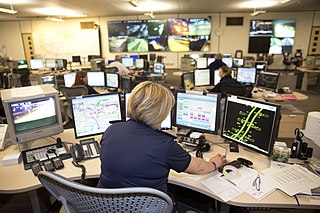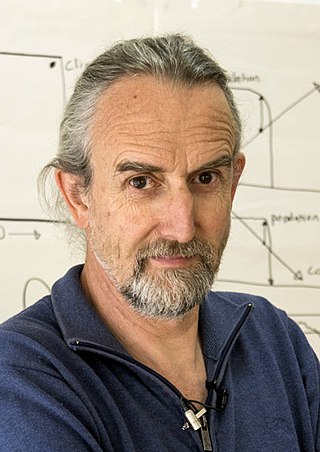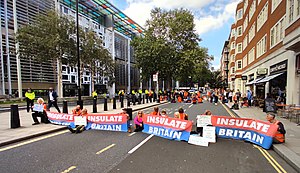
The M25 or London Orbital Motorway is a major road encircling most of Greater London. The 117-mile-long (188 km) motorway is one of the most important roads in the UK and one of the busiest. Margaret Thatcher opened the final section in 1986, making the M25 the longest ring road in Europe upon opening. The Dartford Crossing completes the orbital route but is not classed as motorway; it is classed as a trunk road and designated as the A282. In some cases, including notable legal contexts such as the Communications Act 2003, the M25 is used as a de facto alternative boundary for Greater London.

The fuel protests in the United Kingdom were a series of campaigns held in response to the rising petrol and diesel fuel prices for road vehicle use. There have been three major campaigns amongst many other protests in the 21st century. The first major protest in 2000 was primarily led by independent lorry owner-operators. One group of lorry owner-operators from the South East of England formed a protest group called "TransAction" that protested at oil refineries and fuel depots in Essex. Protests and blockades of oil facilities caused widespread disruption to the supply of petroleum products. The aim of the protests was to secure a reduction in the fuel duty rate on petrol and diesel, which the government refused to enact. After the protest ended, the government did announce a freeze on fuel duties, and promised changes would be made to the way that goods vehicles were taxed, which would include the taxing of foreign vehicles operating on British roads.

Ratcliffe-on-Soar Power Station is a decommissioned coal-fired power station owned and operated by Uniper at Ratcliffe-on-Soar in Nottinghamshire, England. Commissioned in 1968 by the Central Electricity Generating Board (CEGB), the station had a capacity of 2,000 MW. It was the last remaining operational coal-fired power station in the UK, and closed on 30 September 2024, marking the end of coal-powered electricity generation in the United Kingdom.

The modern environmental direct action movement in the United Kingdom started in 1991 with the formation of the first UK "Earth First!" group for a protest at Dungeness nuclear power station. Within two years, there were fifty Earth First groups and activists linked with other parties in the road protest movement. There were large camps at Twyford Down and the M11 link road protest. By 1997, the Government had decided to reduce its road-building plans by two thirds.

The Camps for Climate Action are campaign gatherings that take place to draw attention to, and act as a base for direct action against, major carbon emitters, as well as to develop ways to create a zero-carbon society. Camps are run on broadly anarchist principles – free to attend, supported by donations and with input from everyone in the community for the day-to-day operation of the camp. Initiated in the UK, camps have taken place in England at Drax power station, Heathrow Airport, Kingsnorth power station in Kent, the City of London and The Royal Bank of Scotland Headquarters, near Edinburgh. During 2009 camps also took place in Canada, Denmark, France, Ireland, Netherlands/Belgium, Scotland, Wales and Australia.

Plane Stupid is a UK-focused group of environmental protesters who state their aim as wanting to see an end to airport expansion for what it sees as "unnecessary and unsustainable" flights. It is a loose association of autonomous regional groups, and is funded by donations.

Road protests in the United Kingdom usually occur as a reaction to a stated intention by the relevant authorities to build a new road, or to modify an existing road. Reasons for opposition to opening new roads include a desire to reduce air pollution and thus not wishing to incentivise increased or sustained car usage, and/or a desire to reduce or maintain low noise pollution by not having or increasing the use of motor vehicles in the area of the planned/proposed road. Protests may also be made by those wishing to see new roads built, changes made to existing roads, or against restricting their use by motor traffic.
Rebecca Lush is a British environmental activist who helped organise a number of major anti-road initiatives, including the support organisation ‘Road Block’. She joined Transport 2000 as Roads and Climate Campaigner, exposing cost overruns, and now works for Transport Action Network in a similar role.

A smart motorway, also known in Scotland as an intelligent transport system, is a section of motorway in the United Kingdom that employs active traffic management (ATM) to increase capacity. Technologies used include Motorway Incident Detection and Automatic Signalling (MIDAS), variable speed limits and variable lane control. At particularly busy times, ramp metering may be used, and some roads permit the hard shoulder to be used as a running lane.

Extinction Rebellion is a UK-founded global environmental movement, with the stated aim of using nonviolent civil disobedience to compel government action to avoid tipping points in the climate system, biodiversity loss, and the risk of social and ecological collapse. Extinction Rebellion was established in Stroud in May 2018 by Gail Bradbrook, Simon Bramwell, Roger Hallam, Stuart Basden, along with six other co-founders from the campaign group Rising Up!

Greta Tintin Eleonora Ernman Thunberg is a Swedish environmental activist known for challenging world leaders to take immediate action to mitigate the effects of human-caused climate change.

Julian Roger Hallam is an environmental activist who co-founded Extinction Rebellion, Just Stop Oil, Insulate Britain, the cooperative federation organisation Radical Routes, and the political party Burning Pink. In April 2024, Hallam was given a suspended two-year sentence for attempting to block Heathrow Airport with drones. In July 2024, Hallam was convicted of conspiracy to cause a public nuisance for organising protests to block the M25 motorway two years prior, for which he was sentenced to five years' imprisonment.
Extinction Rebellion (XR), a 2018 UK-founded environmental movement, has since spread to the rest of Europe, the United States, and other countries, forming an international "non-violent civil disobedience" movement through mass protest. XR carries out demonstrations to highlight governments' inaction on climate change. Since 2018, Extinction Rebellion has taken a variety of actions in Europe, the US, and elsewhere in the world, to urge political and economic forces to take action amid the climate crisis. Although, their non-violent disobedience protests are an effort to generate attention around environmental issues, XR activists have become known for civil disobedience and disruptive tactics.

Animal Rising is a British animal activist movement with the stated aim of compelling social change towards animal rights and a plant-based food system. They justify their actions with the impact of animal agriculture on climate change, species extinction and ecosystem breakdown.

The Police, Crime, Sentencing and Courts Act 2022 is an act of the Parliament of the United Kingdom that was introduced by the Home Office and the Ministry of Justice. It gives more power to the police, criminal justice, and sentencing legislation, and it encompasses restrictions on "unacceptable" protests, crimes against children, and sentencing limits. It was passed by the Houses of Parliament on 26 April 2022 and received Royal Assent on 28 April 2022.

Protests against old-growth logging in the southern Vancouver Island region of British Columbia, Canada escalated through later 2020 and into 2021. These events, many coalescing around the Fairy Creek watershed northeast of Port Renfrew, represent a critical moment in BC's recurring history of conflict related to ecological values and the forest industry, recalling the Clayoquot Protests of the early 1990s. It has been described as "one of the largest [acts of] civil disobedience in Canadian history," with over 1,000 protesters arrested on the site as of February 11, 2022.

Impossible Rebellion was a series of nonviolent climate change protests in the United Kingdom organised by Extinction Rebellion (XR), from 23 August 2021 to 4 September 2021. The protests particularly targeted the City of London to raise awareness of the role of the financial sector in climate change. Protesters during the Impossible Rebellion demanded that the UK government cease new investments in the fossil fuel industry. XR also demand that the government declare a climate emergency, reach net zero carbon emissions by 2025 and create a citizens' assembly on climate change.

Just Stop Oil is a British environmental activist group primarily focused on the issue of human-caused climate change. The group aims to lobby the British government to commit to ending new fossil fuel licensing and production using civil resistance, nonviolent direct action, traffic obstruction, and vandalism.

R v Hallam was a 2024 British court case involving five activists from the climate protest group Just Stop Oil. The activists were convicted of conspiracy to cause public nuisance after they organised protests to block the M25 motorway in November 2022. Roger Hallam, co-founder of Just Stop Oil and Extinction Rebellion, was sentenced to five years' imprisonment, while his fellow activists Daniel Shaw, Louise Lancaster, Lucia Whittaker De Abreu and Cressida Gethin were sentenced to four years each. The activists have been collectively referred to as the "Whole Truth Five" in Just Stop Oil's social media posts.
Phoebe Plummer is a British climate activist. Initially inspired by a United Nations report from the Intergovernmental Panel on Climate Change, they joined Just Stop Oil in August 2022 and were arrested three times in their first week. An October 2022 protest, in which Plummer and Anna Holland threw tomato soup at a Vincent Van Gogh Sunflowers painting at London's National Gallery, caused worldwide outrage and £10,000 damage to the frame but emboldened activists to carry out similar actions. Plummer was sentenced the following month for blocking the M25 motorway. In November, Plummer and other activists caused tailbacks on multiple roads in West London with a slow march protest, for which they faced the first jury trial under section 7 of the Public Order Act 2023.

















